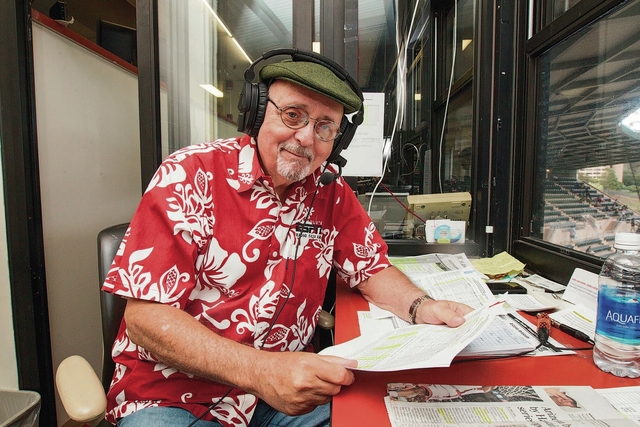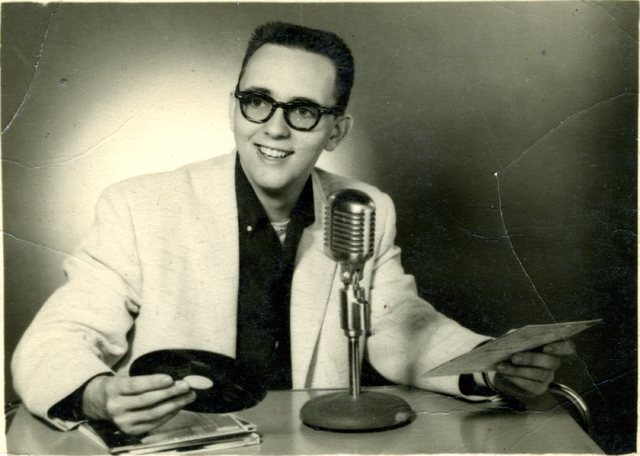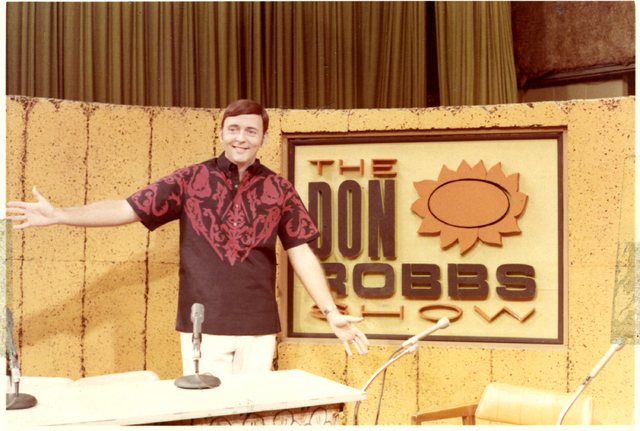
For Don Robbs, the old recruiting lure “Join the Army and See the World” proved to be much more truism than hollow come-on. It was a call that led him from small-town Minnesota to the other side of the planet and points in between.
In short, Don’s stint with the army began to open his eyes to a broader world. Eventually, he would have the opportunity to live and work in Japan (a place he likes to refer to as his second home), begin what would become a storied broadcasting career in Hawaii, and visit other interesting spots.
And, not coincidentally, Don became part of the JapanBall family and an eventual Hall of Famer.
Robbs has been on six JapanBall tours and is one of just 60 people who have qualified for the Hall. He’s seen games in every ballpark except the one in Hokkaido where the Nippon-Ham Fighters play.
In fact, he’s a double Hall-of-Famer, having been inducted into the University of Hawaii Athletics HOF in 2015, thanks to his 40-year association with the school as a broadcaster and master of ceremonies.
Memories abound. To name just a few:
- He has been the play-by-play announcer for many sports, a radio station general manager, radio talk-show host, TV news anchor, and television variety-show host.
- He’s called more than 3,000 baseball games, including those of the University of Hawaii, the then-Hawaii Islanders minor league team, and the now-extinct Hawaii winter league.
- He was involved with the 1964 Summer Olympic Games in Tokyo while working with an advertising agency.
- While in the Army in Korea, he was caught in the middle of a violent overthrow of the Korean government.
- When he would call University of Hawaii games at Louisiana Tech, a nearby train would stop for 5-10 minutes so the engineer could take a break and watch the game.
- Once at San Francisco State, he and his crew couldn’t find the telephone line necessary for the broadcast. They finally found the hookup in the laundry room of a nearby women’s dormitory, and they had to string a lot of cable to reach from there to the radio booth.
These are just the highlights; for someone who was raised in Litchfield, Minnesota, 50 miles outside of Minneapolis—there was much more. Born during the Depression, he grew up with World War II raging and came of age during the Korean War, the Cold War, and the so-called boring 1950s – which actually were anything but. Then the long arm of Uncle Sam yanked him halfway around the world and into a different reality – from white picket fences and “Leave it to Beaver” to nothing like he’d seen before.
And he loved it.
“Of all the great things I’ve experienced, living and working in Japan is the highlight,” Robbs said.
And just exactly how did that happen?
Well, as a youngster, he grew up on baseball as a fan of the local town team and of the Minneapolis Millers, the AAA affiliate of the then-New York Giants. As a college student at St. Cloud (MN) State, he got a job with the radio station that would broadcast the games of the local minor league team – the St. Cloud Rox—so named, Robbs says, because the main industry in the city at the time was making gravestones. He was the local news anchor and did the baseball gig on the side.
Following graduation, the Army intervened – in those days, there was this thing called the draft – and completely re-routed what had seemed, to that point, a predictable life journey.
“After basic training, the Army asked me where I wanted to go, and I said Germany . . . so I ended up in Korea,” Robbs said with a chuckle. “. . . and it was great. That was the beginning of my love affair with Asia.”
It was also where he had the harrowing experience of being in the middle of a coup. The government of South Korean dictator Syngman Rhee had steadily become more unpopular because of its authoritarian ways, and students took tothe streets one day in April 1960.
“Our office was in the Korean Broadcasting building, near where the president lived,” Robbs said. “We heard tanks rumbling, went outside to look and could see multitudes of students in their school uniforms walking toward the president’s residence. People told us this wasn’t just another demonstration and that we should hunker down in our building. We ignored that at first but then started hearing gunfire, so we went back inside and locked the doors.”
They remained in the building for the remainder of the night, sleeping wherever and whenever they could. After things quieted somewhat the next day, Robbs and the others returned to their headquarters, and Rhee was overthrown shortly after.
Later that year, Robbs was told he’d be re-assigned to a base stateside, but he asked if there was any way he could stay in Asia. That time, he got his wish, transferring to a base near Tokyo in 1960. And he received a blessing in disguise the following year when – a week before he was supposed to be discharged from the Army – President John Kennedy extended the tours of many soldiers following the failed Bay of Pigs invasion that eventually led to the 1962 Cuban Missile Crisis.
“Looking back on it, the extension was the best thing that’s happened to me,” Robbs acknowledged.
A year later, while living in the barracks, a friend suggested they go to a baseball game, and that proved serendipitous.
“I loved baseball anyway, [but] then I fell in love with the Japanese game,” he said. “It was great going to the old [Korakuen Stadium], which was right where the Tokyo Dome is now.”
And there was much more. Robbs tells of the Meiji Club, a gathering spot for field-grade officers, civil service employees and civilian embassy employees. He lucked into becoming the master of ceremonies for the nightly floor shows and got to meet performers – such as the Kingston Trio – who were popular at the time.
“I would work my Army job during the day, then take the train to the club. I’d get home pretty late . . . well, sometimes I didn’t,” he said. “Occasionally, I’d get back to the barracks in time to shower, change clothes, eat and go to work.”
Robbs got out of the Army in 1962 and headed home, but fate again intervened. He stopped in Hawaii to see a friend, was offered a radio job, and decided to stay. Still, the lure of Japan remained.
“I loved Hawaii but wanted to go back to Japan in the worst way,” he acknowledged.
In the spring of 1964, he placed an advertisement in the Japan Times to look for work. Soon after, he learned that – in advance of the Olympics – a Japanese public relations group was looking for foreigners with sports experience. He interviewed with a representative who happened to be traveling in Hawaii, was offered a job, and soon found himself back in Tokyo as a member of the account team supporting Seiko, the official timekeeper of the Olympic games.
He was there until 1966 when he decided a move was in order – “I wasn’t making a lot of money, and there was a glass ceiling at the company since I was a foreigner.”
He next spent a year or so at KYA Radio, then the top rock station in San Francisco. KYA was the “presenting station” for what was the Beatles’ final live performance – held at San Francisco’s Candlestick Park in August 1966. Robbs didn’t get to meet the Fab Four, but he and his wife had front-row seats for the concert.
“It was hard to hear because the sound system was bad, and all the teenagers were making so much noise,” Robbs said wryly. “My wife was pregnant then with our son, Scott. We like to say that he met the Beatles before a lot of Americans did.”
KYA was sold the following year, and he returned to Hawaii to look for a job.
“At that point, I thought I was never going to settle down,” he said.

In short order, though, he got hired at a radio/TV outlet. He was the television news anchor within a few months and even had his own eponymous morning variety show. The stations owner was also a minority owner of the San Francisco Giants and got the station on the club’s radio network, so Robbs would occasionally fly over to see the Giants play.
After a time, too, Hall-of-Fame broadcaster Al Michaels joined the team as sports director and the radio voice of the Hawaii Islanders.
“It’s funny how things work,” Robbs said. “Al wanted to do an Islander playoff game on TV for a competitor, and his boss wouldn’t let him. So Al quit on the spot, did the game and – very soon after – got an offer from the Cincinnati Reds that really moved him up the ladder.”

A few years later, Robbs took over the Islander broadcasts for a couple of seasons before another station acquired the broadcast rights.
Later in the 1970s, Robbs convinced his station to broadcast a University of Hawaii baseball playoff game. The station owner resisted at first, but went along when Robbs told him it wouldn’t cost the station anything. The game attracted 16,000 fans and brought in some advertising revenue, so the station carried the games from then on – with Robbs at the microphone for 40 seasons before retiring in 2016.
“I never made any money doing those games,” Robbs said. “It was an avocation. I just loved doing it.”
Honolulu, Hawaii news, sports & weather – KITV Channel 4
JapanBall veteran Leon DeHaven listened to Robbs on radio and television while he was with the Army in Hawaii, and they later reconnected on JapanBall tours.
“The first thing we’d do on JapanBall trips was hold a meeting in someone’s room to introduce everyone and go over details,” DeHaven said. “Don said he was from Honolulu and that he broadcast U of Hawaii baseball games. I introduced myself and told him he sounded much like the guy that did the Islander games back in the early ‘70s. He said, ‘Well, I was.’ We got to be friends, and I even went to his retirement party several years later.”

In addition to his regular job with the station, which sometimes took him to places such as Guam and American Samoa as a consultant – “a great adventure” – he handled pre-game and halftime coverage of the NFL’s Pro Bowl for many years and also worked with his son Scott, announcing Hawaii Winter Baseball games.
Over the years, he estimates that he’s made 35 or so trips to Japan. His first tour with JapanBall came in 2009.
“I was friends with the head of the Associated Press bureau in Honolulu and told him I wanted to go back to Japan and see some more baseball, and he said he knew just the guy for me to talk with,” Robbs said.
That would be JapanBall founder Bob Bavasi, son of Buzzie Bavasi, the former long-time Los Angeles Dodger General Manager.
“I told Bob I wanted to go but warned him that I was a [San Francisco] Giants fan,” Robbs said with a laugh.
In spite of that, things worked out well.
“Don is one of the great guys of all time,” Bavasi said. “There would be occasions on trips when things weren’t going right, and I’d be frazzled, but he’d step in with this very calm voice. He’s so easy to talk with and so knowledgeable. I was very fortunate to have him on trips. He made my job easier by answering questions that people might otherwise ask me.”
“He just likes being in Japan and going to the games,” Bavasi continued. “He was usually in the lobby reading the paper and waiting to go to the game. When he’s in the group, he gives off an air of how to comport oneself on the road. He gives off a really good vibe.”
Robbs, now 84, hasn’t toured in a few years because of health problems. He had a heart attack and stroke in 2013 that necessitated a quintuple-bypass procedure and 31-day hospital stay.
He eventually recovered enough to broadcast U of H baseball for two more seasons and try another JapanBall trip, but the tour was “too much physically.” He stopped announcing University of Hawaii games in 2016.
“I loved doing Hawaii baseball,” he said, but going back to work after the heart attack was a mistake. I didn’t sound right. The coach told me that people were saying I didn’t sound like myself anymore.”
Currently, Robbs is isolating because of the Covid-19 pandemic. He lives with his son’s family near Pearl Harbor, and a daughter and two other grandchildren reside nearby.
“I can’t go anywhere at the moment, but – like everyone – I’m hoping that things eventually get better now that we have vaccines. I like all sports and hope to be able to attend games again.”

Regardless of what the future may hold, Robbs knows that he’s been very fortunate. “I never imagined any of this when I was growing up,” he acknowledged. “I’ve had the great luck of being able to see and do so many things and meet so many great people. I couldn’t ask for a better adventure than my life has been.”
3 comments
Thanks Carter! I thoroughly enjoyed reading your article about Don Robbs. My wife and I met Don ( and Leon) on the 2014/2015 Japanball trips. Don is such a gentleman. I hope he can resume his Japanball trips after this Covid thing is finally over.
A gentleman indeed! Carter sends his regards.
[…] a party that we end the trip with (and is named in honor of JapanBaller and Hawaii baseball legend Don Robbs),” Bavasi said. “And he’ll sit up at all hours talking. Several years ago, […]